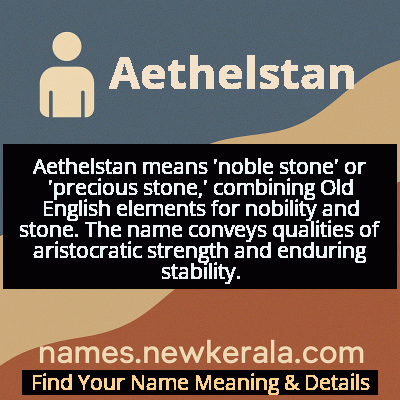Aethelstan Name Meaning & Details
Origin, Popularity, Numerology Analysis & Name Meaning of Aethelstan
Discover the origin, meaning, and cultural significance of the name AETHELSTAN. Delve into its historical roots and explore the lasting impact it has had on communities and traditions.
Name
Aethelstan
Gender
Male
Origin
Anglo
Lucky Number
6
Meaning of the Name - Aethelstan
Aethelstan means 'noble stone' or 'precious stone,' combining Old English elements for nobility and stone. The name conveys qualities of aristocratic strength and enduring stability.
Aethelstan - Complete Numerology Analysis
Your Numerology Number
Based on Pythagorean Numerology System
Ruling Planet
Venus
Positive Nature
Harmonious, responsible, caring, and artistic.
Negative Traits
Overly idealistic, superficial, possessive, or jealous.
Lucky Colours
Pink, turquoise.
Lucky Days
Friday.
Lucky Stones
Diamond, turquoise.
Harmony Numbers
2, 3, 9.
Best Suited Professions
Artists, musicians, teachers, healthcare workers.
What People Like About You
Warmth, nurturing nature, artistic flair.
Famous People Named Aethelstan
Æthelstan
King of England
First king to rule all of England, established royal administration and legal systems
Æthelstan Half-King
Ealdorman of East Anglia
Influential regent and powerful noble during the 10th century
Aethelstan of Hereford
Anglo-Saxon thegn
Prominent military leader and landowner in pre-Conquest England
Name Variations & International Equivalents
Click on blue names to explore their detailed meanings. Gray names with will be available soon.
Cultural & Historical Significance
Beyond political significance, Aethelstan's name is associated with cultural and religious patronage. He was known as a great collector of relics and manuscripts, fostering learning and the arts during his reign. His court attracted scholars from across Europe, and he implemented legal reforms that influenced English common law. The name thus carries connotations of enlightened rulership, cultural sophistication, and the establishment of institutions that would endure long after the Anglo-Saxon period ended. In modern historical consciousness, Aethelstan represents the ideal of strong, just leadership and the foundation of English political tradition.
Extended Personality Analysis
Those bearing the name Aethelstan are often characterized by their natural authority and strategic mindset. They tend to be forward-thinking individuals who combine traditional values with innovative approaches to problem-solving. Their leadership style typically involves careful planning, patience, and the ability to see the bigger picture, much like the historical king who patiently built alliances and administrative systems. Aethelstans often possess a strong sense of duty and responsibility, feeling compelled to make meaningful contributions to their communities or fields of work.
In personal relationships, Aethelstans are typically loyal and protective, valuing deep connections over superficial social networks. They may appear reserved at first but reveal warmth and wisdom to those they trust. Their combination of 'noble' and 'stone' elements in the name's meaning often manifests as both aristocratic dignity and unshakable reliability. They're frequently drawn to history, law, education, or leadership roles where they can build lasting structures or institutions. While they can be traditional in their outlook, they're not inflexible—rather, they seek to preserve what's valuable while adapting to necessary changes, embodying the balance between heritage and progress that characterized their namesake's successful reign.
Modern Usage & Popularity
In contemporary naming practices, Aethelstan remains an exceptionally rare choice, primarily used by parents with strong interests in English history or those seeking a distinctive name with deep cultural roots. Its usage is almost exclusively confined to the United Kingdom, particularly England, where its historical significance is most appreciated. The name has seen a minor resurgence in recent decades as part of the broader trend toward reviving Old English and Anglo-Saxon names, though it remains far less common than names like Alfred or Edward. Modern parents who choose Aethelstan typically appreciate its strong, traditional sound and the weight of history it carries. The name is often simplified to 'Athelstan' or 'Ethelstan' in contemporary usage to improve accessibility while maintaining its historical connection. It's considered a bold, intellectual choice that signals the parents' values of tradition, strength, and cultural continuity.
Symbolic & Spiritual Meanings
Symbolically, Aethelstan represents the ideal of noble stability and foundational strength. The combination of 'aethel' (noble) and 'stan' (stone) creates a powerful metaphor for leadership that is both aristocratic in character and solid in foundation. It symbolizes the concept of being a cornerstone—someone who provides essential support and stability within their family, organization, or community. The name evokes images of ancient standing stones and royal authority, suggesting endurance through challenges and the establishment of lasting legacies. In a psychological sense, it represents the integration of high ideals with practical implementation, of visionary leadership with administrative competence. Aethelstan symbolizes the bridge between aspiration and achievement, between noble intentions and concrete results. It carries the metaphorical weight of historical continuity, suggesting that true strength comes from understanding one's place in a larger historical narrative while building for the future.

